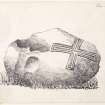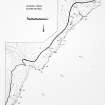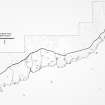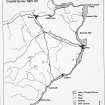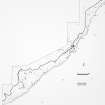Pricing Change
New pricing for orders of material from this site will come into place shortly. Charges for supply of digital images, digitisation on demand, prints and licensing will be altered.
Upcoming Maintenance
Please be advised that this website will undergo scheduled maintenance on the following dates:
Thursday, 30 January: 11:00 AM - 3:00 PM
During these times, some functionality such as image purchasing may be temporarily unavailable. We apologise for any inconvenience this may cause.
Lybster Church, Cross-inscribed Stone
Cross Incised Stone (Early Medieval)
Site Name Lybster Church, Cross-inscribed Stone
Classification Cross Incised Stone (Early Medieval)
Alternative Name(s) Lat 243; Lybster Harbour
Canmore ID 8619
Site Number ND23NW 2
NGR ND 2481 3610
Datum OSGB36 - NGR
Permalink http://canmore.org.uk/site/8619
- Council Highland
- Parish Latheron
- Former Region Highland
- Former District Caithness
- Former County Caithness
Lybster, Caithness, cross-marked boulder
Measurements: L 0.91m, W 0.66m
Stone type: yellow sandstone
Place of discovery: ND c 247355
Present location: Lybster Central Church.
Evidence for discovery: recorded c1726 and in 1910 by RCAHMS, in a field to the NE of Lybster harbour. In 1935 it was moved to Lybster Congregational Church graveyard, and thence in 1972 or 1973 to Lybster Central Church.
Present condition: good
Description
A natural boulder on which an equal-armed cross had been cut, with an internal cross of the same shape.
Date: eighth or ninth century.
Desk-based information compiled by A Ritchie 2016
Field Visit (19 July 1910)
Lying on the grassy slope between the two ranges of cottages that run N. and S. to the NE. of the harbour of Lybster, and some 40 yards S. of the northmost cottages, is a block of yellow sandstone. In form it is roughly triangular, measuring some 2' 2" x 3'. A large basin-shaped depression, which appears to be natural, runs in from the left edge, and another large hole has been worn by weather near the lower end of the stone. Cut across the right-hand corner is an equal-limbed Celtic cross measuring 1' 8" in width. The arms expand outwards from 5 1/2" to 7" and their extreme length and the 1 3/4" in width.
This stone is referred to in the description of parish of Latheron (c. 1726), published in Macfarlane's Geographical Collections, as follows: " On the face of a brae above the inlett of this burn (Risgil) there is a stone to which, as the natives tell, many frequented in time of superstition. It's hollow where they sate and on the back there is is the figure of a cross tripled cutt out. ther are some hollow places on both sides as if designed for both the elbows."
Visited by RCAHMS, 19th July 1910
W Macfarlane 1906-8
Field Visit (1911)
Sculptured Stone: A roughly triangular stone, about 2ft by 3ft, lies on a grassy slope between two ranges of cottages, aligned N-S, to the NE of Lybster Harbour, and some 40 yds S of the northernmost cottages. An equal-limbed Celtic cross, 20ins wide, is cut across its right corner. About 1726 (Macfarlane 1906-8) the stone was said to lie 'on the face of a brae above the inlett of this burn (Risgil) to which.... many frequented in the time of superstition.'
W Macfarlane 1906-8; RCAHMS 1911.
Field Visit (11 May 1967)
(ND 2479 3564) This cross-inscribed stone is now in Lybster Congregational Churchyard, 13ft E of the NW corner. It was moved, for its preservation, at the instigation of the Rev Robert Wilson on 23rd October 1935. In April 1964 the clerk of the Congregational Board confirmed that the stone was under a shelter in the churchyard. He said that it was believed to have been dug up near the Well of the Brethren (ND 2424 3494) when Lybster harbour was being built several years before 1840 (NSA 1845).
NSA 1845; Information from P R Ritchie, DoE to OS (file No. SC 24028/1A)
A cross-inscribed stone, as described and illustrated by the RCAHMS. Surveyed at 1:2500.
Visited by OS (N K B) 11 May 1967.
Field Visit (1982)
ND 2481 3610. This stone was moved from Lybster Congregational Church to the Central Church, Lybster in 1972-3 (information from Mr Gunn, Post office, Lybster).
C Batey 1982.
Field Visit (24 March 1983)
The stone is under a shelter in the position noted by Batey.
Visited by OS (J M) 24 March 1983.






















